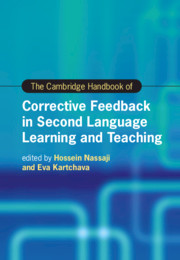Book contents
- The Cambridge Handbook of Corrective Feedback in Second Language Learning and Teaching
- Cambridge Handbooks in Language and Linguistics
- The Cambridge Handbook of Corrective Feedback in Second Language Learning and Teaching
- Copyright page
- Contents
- Figures
- Tables
- Contributors
- Acknowledgments
- Introduction Corrective Feedback in Second Language Teaching and Learning
- Part I Theoretical Perspectives on Corrective Feedback
- Part II Methodological Approaches in the Study of Corrective Feedback
- Part III Different Delivery Modes of Corrective Feedback
- Part IV Feedback Provider, Feedback Intensity, and Feedback Timing
- Part V Corrective Feedback and Language Skills
- Part VI Contexts of Corrective Feedback and Their Effects
- 22 Corrective Feedback in Second versus Foreign Language Contexts
- 23 Corrective Feedback in Computer-Mediated versus Face-to-Face Environments
- 24 Corrective Feedback in Mobile Technology-Mediated Contexts
- 25 Oral Corrective Feedback in Content-Based Contexts
- Part VII Learners’ and Teachers’ Feedback Perspectives, Perceptions, and Preferences
- Part VIII Individual Differences, Tasks, and Other Language- and Learner-Related Factors
- Index
- References
23 - Corrective Feedback in Computer-Mediated versus Face-to-Face Environments
from Part VI - Contexts of Corrective Feedback and Their Effects
Published online by Cambridge University Press: 26 February 2021
- The Cambridge Handbook of Corrective Feedback in Second Language Learning and Teaching
- Cambridge Handbooks in Language and Linguistics
- The Cambridge Handbook of Corrective Feedback in Second Language Learning and Teaching
- Copyright page
- Contents
- Figures
- Tables
- Contributors
- Acknowledgments
- Introduction Corrective Feedback in Second Language Teaching and Learning
- Part I Theoretical Perspectives on Corrective Feedback
- Part II Methodological Approaches in the Study of Corrective Feedback
- Part III Different Delivery Modes of Corrective Feedback
- Part IV Feedback Provider, Feedback Intensity, and Feedback Timing
- Part V Corrective Feedback and Language Skills
- Part VI Contexts of Corrective Feedback and Their Effects
- 22 Corrective Feedback in Second versus Foreign Language Contexts
- 23 Corrective Feedback in Computer-Mediated versus Face-to-Face Environments
- 24 Corrective Feedback in Mobile Technology-Mediated Contexts
- 25 Oral Corrective Feedback in Content-Based Contexts
- Part VII Learners’ and Teachers’ Feedback Perspectives, Perceptions, and Preferences
- Part VIII Individual Differences, Tasks, and Other Language- and Learner-Related Factors
- Index
- References
Summary
Three decades of research have established that simultaneous computer-mediated communication (SCMC) can impact L2 development processes, including corrective feedback, and their products, in new and exciting ways. However, the high variability of the evidence calls for more theoretical and methodological rigor, and the proliferation of hybrid and online learning curricula makes it imperative to assess SCMC’s contributions on the basis of sound comparisons with mirror FTF conditions. Against this backdrop, this chapter critically synthesizes forty-one studies comparing the effects of written SCMC versus FTF interaction on L2 development, filtering contradictory findings through the sieve of methodological validity and the often-neglected notion of modality. Results suggest that written SCMC amplifies feedback effectiveness in tutor–learner interactions but not so clearly in peer interactions; that it promotes lower output rates but more equal participation; that it elicits shorter utterances, but maybe more accurate and complex grammar and vocabulary; that it promotes less negotiation for meaning but maybe denser and more explicit negotiation of form; that it is more likely to subvert the negotiate-over-lexis-first principle; and that it yields less successful uptake and maybe less modified output but more self-corrections. The chapter concludes with future research recommendations based on the three dimensions of modality.
Keywords
Information
- Type
- Chapter
- Information
- The Cambridge Handbook of Corrective Feedback in Second Language Learning and Teaching , pp. 494 - 519Publisher: Cambridge University PressPrint publication year: 2021
References
Accessibility standard: Unknown
Why this information is here
This section outlines the accessibility features of this content - including support for screen readers, full keyboard navigation and high-contrast display options. This may not be relevant for you.Accessibility Information
- 3
- Cited by
